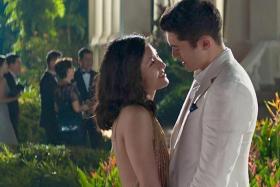Soldiers given voices in century-old footage in Jackson's documentary
Peter Jackson hired forensic lip readers to give soldiers a voice
For his new World War I documentary film They Shall Not Grow Old, Peter Jackson was adamant the soldiers - some just teenagers - should tell their own stories from the frontlines.
To do that, the Oscar-winning New Zealand director hired forensic lip readers to go through more than 80 hours of silent film archive video footage of the war and uncover the conversations that took place in the trenches and on the battlegrounds 100 years ago.
Those words were mixed with interviews with former soldiers from 600 hours of audio tape in the BBC archives to create an unprecedented 99-minute documentary that includes only the words of the soldiers themselves, in a full-colour 3D war as they would have seen it.
They Shall Not Grow Old opens here on Dec 15 exclusively at The Projector.
"There has been lots of documentaries made on the First World War... and I just decided for this one to strictly just use the voices of the guys who fought there," Jackson, who helmed The Hobbit and The Lord Of The Rings series, said.
"So no historians, no narration, no nothing."
Old film was meticulously and painstakingly restored by specialists. Computers were used, not only to add colour to black-and-white footage, but also to remove imperfections, fill splices and reconstruct missing frames from film that was shot with fewer frames per second than today.
Forensic lip readers, who usually work with the police determining what people say on silent security camera footage, were able to decipher the words spoken long ago on film.
Actors were hired to give the soldiers on screen a voice.
Jackson, 57, said: "I was absolutely gobsmacked by the time we had finished restoring this stuff; I'd had no idea that it could be done so well.
"People have restored film before, but they haven't really restored it to the nth degree."
He said of the process: "The film became very emotional. The faces of the men just suddenly come to life... I'm suddenly looking at this like I've never seen it before.
"Just looking at their faces and their expressions, they become real human beings - the nuances, the little things."
The project began four years ago in the office of Ms Diane Lees, director-general of Britain's Imperial War Museums.
Aware that Jackson was a WWI "addict" whose grandfather fought in the war, Ms Lees pitched him the idea of collaborating for the centenary of the conflict as part of 14-18 NOW, a programme of events to commemorate the landmark.
An estimated 17 million people were killed in the war, many of them on the battlegrounds in northern France and Belgium.
Around one million of those who died were from Britain and its then empire. - REUTERS/AFP
Get The New Paper on your phone with the free TNP app. Download from the Apple App Store or Google Play Store now




